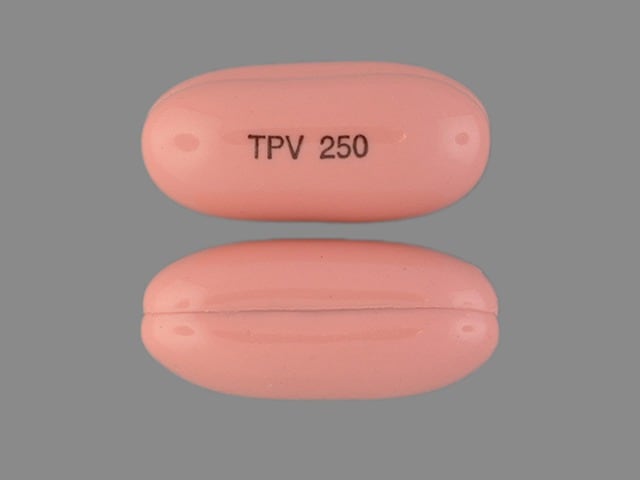What is Aptivus?
Aptivus is a prescription medicine used with ritonavir and other anti-HIV-1 medicines to treat Human Immunodeficiency Virus-1 (HIV-1) infection in people who:
- have taken anti-HIV-1 medicines in the past, and
- whose healthcare provider determines that they meet certain requirements
HIV-1 is the virus that causes AIDS (Acquired Immune Deficiency Syndrome).
It is not known if Aptivus is safe and effective in children under 2 years of age.
What is the most important information I should know about Aptivus?
Aptivus can cause serious side effects, including:
- Liver problems. People who take Aptivus with ritonavir may develop severe liver disease that can cause death. If you have chronic hepatitis B or C infection, you are at increased risk for liver problems. Your healthcare provider should do blood tests before you start taking Aptivus with ritonavir and regularly during treatment. If you get any of the following symptoms of liver problems, you should stop taking Aptivus and ritonavir and tell your healthcare provider right away:
- tiredness
- not feeling well
- loss of appetite
- nausea
- yellowing of your skin or whites of your eyes
- dark (tea-colored) urine
- pale stools (bowel movements)
- pain, ache, or sensitivity on your right side below your ribs
- Bleeding in your brain (intracranial hemorrhage, or ICH). People taking Aptivus with ritonavir may develop bleeding in the brain that can cause death. Tell your healthcare provider about any unusual or unexplained bleeding during treatment with Aptivus with ritonavir.
See "What are the possible side effects of Aptivus?" for more information about side effects.
Who should not take Aptivus?
Do not take Aptivus if you:
- have moderate to severe liver problems
- take any of the following medicines:
- alfuzosin
- amiodarone
- atorvastatin or a product that contains atorvastatin
- bepridil
- cisapride
- ergot-containing medicines:
- dihydroergotamine
- ergonovine
- ergotamine
- methylergonovine
- flecainide
- lovastatin or a product that contains lovastatin
- lurasidone
- midazolam, when taken by mouth
- pimozide
- propafenone
- quinidine
- rifampin
- sildenafil, when used for the treatment of pulmonary arterial hypertension (PAH)
- simvastatin or a product that contains simvastatin
- St. John's wort, or a product that contains St. John's wort
- triazolam
Serious problems can happen if you take any of these medicines with Aptivus.
What should I tell my healthcare provider before taking Aptivus?
Before taking Aptivus, tell your healthcare provider about all of your medical conditions, including if you:
- have hemophilia
- have a medical condition that increases your risk of bleeding, including trauma or surgery, or are taking medicines that increase your risk of bleeding
- have liver problems, including hepatitis B or hepatitis C
- have high cholesterol or high triglycerides
- are allergic to sulfa (sulfonamide)
- have diabetes
- are pregnant or plan to become pregnant. It is not known if Aptivus can harm your unborn baby. Tell your healthcare provider if you become pregnant during treatment with Aptivus.
- Aptivus may reduce how well hormonal contraceptives (birth control pills) work. Women who may become pregnant should use a different form of birth control or an additional barrier method of birth control during treatment with Aptivus. In addition, there may be an increased risk of rash when Aptivus is taken with birth control pills.
- are breastfeeding or plan to breastfeed. Do not breastfeed if you take Aptivus. You should not breastfeed if you have HIV-1 because of the risk of passing HIV-1 to your baby. It is not known if Aptivus can pass into your breast milk. Talk to your healthcare provider about the best way to feed your baby.
Tell your healthcare provider about all the medicines you take including prescription and over-the-counter medicines, vitamins and herbal supplements. Some medicines interact with Aptivus. Keep a list of your medicines to show your healthcare provider and pharmacist.
- You can ask your healthcare provider or pharmacist for a list of medicines that interact with Aptivus.
- Do not start taking a new medicine without telling your healthcare provider. Your healthcare provider can tell you if it is safe to take Aptivus with other medicines.
- If you are taking Aptivus oral solution, which contains vitamin E, you should not take additional vitamin E other than that contained in a standard multivitamin.
How should I take Aptivus?
- Take Aptivus exactly as your healthcare provider tells you.
- Aptivus comes in 2 forms: capsules and oral solution.
- You must take Aptivus at the same time you take ritonavir.
- Aptivus taken with ritonavir capsules or solution can be taken with or without meals.
- Aptivus taken with ritonavir tablets must only be taken with meals.
- The adult dose is 2 Aptivus capsules or 5 mL of Aptivus oral solution taken together with ritonavir twice a day.
- Aptivus taken with ritonavir must be used together with other anti-HIV-1 medicines.
- If your child is taking Aptivus, your child's healthcare provider will decide the right dose based on the child's weight or size. The dose should not be more than the recommended adult dose.
- Your child will be checked to see if they can swallow capsules. If your child cannot swallow an Aptivus capsule, your healthcare provider will prescribe Aptivus oral solution.
- You should swallow Aptivus capsules whole. Do not open or chew the capsules.
- Stay under the care of your healthcare provider during treatment with Aptivus.
- Do not change your dose or stop taking Aptivus without talking to your healthcare provider.
- If you forget to take Aptivus, take the next dose of Aptivus together with ritonavir as soon as you remember. Take your next dose of Aptivus at your normal time. Do not take a double dose to make up for a missed dose.
- When your Aptivus supply starts to run low, get more from your healthcare provider or pharmacy. This is very important because the amount of virus in your blood may increase if the medicine is stopped for even a short time. The virus may develop resistance to Aptivus and become harder to treat.
- If you take too much Aptivus, call your healthcare provider or go to the nearest hospital emergency room right away.
What are the possible side effects of Aptivus?
Aptivus may cause serious side effects, including:
- See "What is the most important information I should know about Aptivus?"
- Rash. Some people who take Aptivus can get a rash including flat or raised rashes or sensitivity to the sun. Women taking hormonal therapy (birth control pills or hormonal replacement therapy) may be at an increased risk of getting a skin rash. If you get any of the following symptoms, stop taking Aptivus and call your healthcare provider right away:
- joint pain or stiffness
- throat tightness
- itching
- muscle aches
- fever
- redness
- blisters
- peeling of the skin
- Diabetes and high blood sugar (hyperglycemia). Some people who take protease inhibitors including Aptivus can get high blood sugar, develop diabetes, or your diabetes can get worse. Tell your healthcare provider if you notice an increase in thirst or if you start urinating more often while taking Aptivus.
- Changes in your immune system (Immune Reconstitution Syndrome) can happen when you start taking HIV-1 medicines. Your immune system may get stronger and begin to fight infections that have been hidden in your body for a long time. Tell your healthcare provider right away if you start having new symptoms after starting your HIV-1 medicine.
- Changes in body fat can happen in people who take HIV-1 medicines. The changes may include an increased amount of fat in the upper back and neck ("buffalo hump"), breast, and around the middle of your body (trunk). Loss of fat from the legs, arms, and face may also happen. The exact cause and long-term health effects of these conditions are not known.
- Increased blood fat (lipid) levels. Some people who take Aptivus with ritonavir have increases in blood fat levels (cholesterol and triglycerides). Your healthcare provider will do blood tests to monitor your blood fat levels before you start taking and during treatment Aptivus with ritonavir.
- Increased bleeding in patients with hemophilia. Some people with hemophilia have increased bleeding with protease inhibitors including Aptivus.
The most common side effects of Aptivus in adults include:
- diarrhea
- nausea
- fever
- vomiting
- tiredness
- headache
- stomach pain
The most common side effects of Aptivus in children were the same as those seen in adults. Rash was seen more frequently in children than in adults.
These are not all of the possible side effects of Aptivus.
Call your doctor for medical advice about side effects. You may report side effects to FDA at 1-800-FDA-1088.
Aptivus Images
General information about the safe and effective use of Aptivus
Medicines are sometimes prescribed for purposes other than those listed in a Patient Information leaflet. Do not use Aptivus for a condition for which it was not prescribed. Do not give Aptivus to other people, even if they have the same condition you have. It may harm them. You can ask your pharmacist or healthcare professional for information about Aptivus that is written for health professionals.
How should I store Aptivus?
- Capsules:
- Store unopened bottles of Aptivus capsules in a refrigerator at 36°F to 46°F (2°C to 8°C).
- Once the bottle of Aptivus capsules is opened, the capsules may be stored at room temperature 68°F to 77°F (20°C to 25°C) and must be used within 60 days after first opening of the bottle.
- Oral Solution:
- Store Aptivus oral solution at 59°F to 77°F (15°C to 25°C).
- Do not refrigerate or freeze Aptivus oral solution.
- Aptivus oral solution must be used within 60 days after first opening of the bottle.
- Keep Aptivus and all medicines out of the reach of children.
What are the ingredients in Aptivus?
Active Ingredient: tipranavir
Capsules - Major Inactive Ingredients: dehydrated alcohol, polyoxyl 35 castor oil, propylene glycol, mono/diglycerides of caprylic/capric acid, and gelatin.
Oral Solution - Major Inactive Ingredients: polyethylene glycol 400, vitamin E polyethylene glycol succinate, purified water, and propylene glycol.
For current prescribing information, you may call Boehringer Ingelheim Pharmaceuticals, Inc. at 1-800-542-6257, or 1-800-459-9906 TTY.





